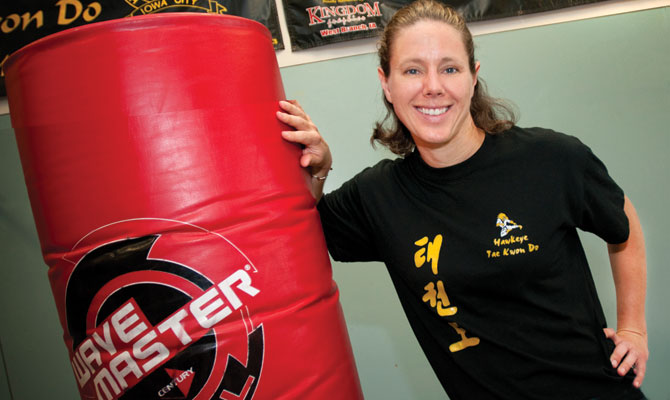 Newsmaker: Christina Johnson.
Newsmaker: Christina Johnson.
With a doctorate in sport psychology, plus expertise as an assistant instructor with Hawkeye Tae Kwon Do, Christina Johnson knows the positive role that sports can play in young people's lives. Earlier this year—as part of a Quad-City Times package about a boxing club operated by a former federal prisoner— Johnson discussed the healthy outlet that physical sports provide children, particularly those considered at-risk.
Sports can teach children how to deal with failure in productive ways, overcome obstacles, manage time and stress, improve self-control, and persevere. Says Johnson, 99BA, 99BS, 01MA, 06PhD, a lecturer in sport and exercise psychology in the UI's Health and Human Physiology Department, "Whether martial arts or boxing, soccer or football, one of the biggest benefits of sports participation is its potential to impart life and coping skills. It's not just about teaching kids how to throw or hit a ball; ideally, it's about teaching them how to work hard and be better at the rest of their lives."
What's the big deal?
The vulnerable children highlighted in the newspaper article came from tough low-income neighborhoods, many living in single-parent households due to a father's incarceration. The article points out that one in four black children born after 1990 will lose a parent to jail, an experience that often leads to behavioral problems, aggression, depression, and poor choices that perpetuate destructive cycles.
A structured sports environment can reduce the chances that children will follow in the footsteps of the past, Johnson says. Sports offer firm boundaries and role models that some children rarely experience—providing an appropriate, controlled setting in which to release aggression, get physical, and learn the importance of following rules.
So, it just works for kids?
Life skills are important for everyone— and it appears that lots of people could benefit from the lessons found in sports. Part of Johnson's work at the university involves supervising a course in stress management. "I've found that many adults don't possess the necessary tools to cope with or manage problems," Johnson says. "Instead, they deal with issues through avoidance, or worse—lying, cheating, and aggression."
Sports involvement can help these individuals, too. As with children from all walks of life, athletic opportunities that focus on growth and development (not so much on winning) can lay a solid foundation for a promising future.

